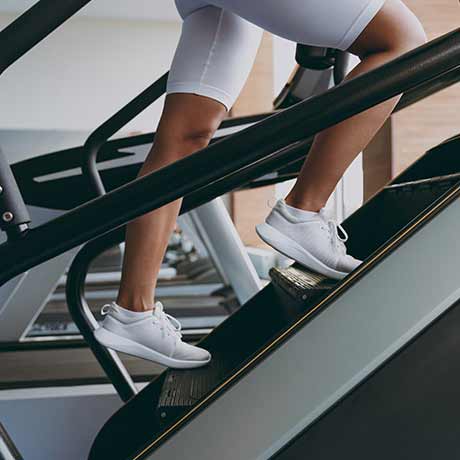Login to your account
- Private & confidential service
- Genuine medication
- All-inclusive service - No hidden fees
- Next day delivery
- Weight Loss
- The benefits of exercise for weight loss
- The secret to battling weight loss plateaus
The secret to battling weight loss plateaus
Weight loss plateaus are almost a certainty when it comes to losing weight. While they can be frustrating, it’s important to remember they’re a perfectly normal part of your journey.
If you’re looking to get the scales moving again, keep reading to learn more about the science behind weight loss plateaus and what you can do about them.
What is a weight loss plateau?
A weight loss plateau is a term coined to describe a short-term stagnation in your weight loss progress. This is a period where you stop losing weight, it remains the same, or just fluctuates slightly.

Weight loss plateaus are common. Research Trusted source National Center for Biotechnology Information (NCBI) Government Source Biomedical Research and Literature Go to source shows that plateaus are particularly common after 6 months on a weight loss journey. However, some people may also experience plateaus after 1 or 2 years of losing weight.
How long does a weight loss plateau last?
There’s no definitive answer to how long a plateau lasts. Some sources suggest that they last for around 4 weeks, but others suggest it could last 2 - 3 months.
What is the scientific cause of weight loss plateaus?
One prominent theory for weight loss plateaus is the ‘set-point theory Trusted source National Center for Biotechnology Information (NCBI) Government Source Biomedical Research and Literature Go to source ’.
This theory suggests that we all have a predetermined weight and fat percentage to function. Your body will do everything in its power to keep you at that set point for the evolutionary purpose of keeping you alive.
Gradual weight gain over several years will trick your body into increasing your set point. So when you try to lose weight, your body may resist to try and maintain fat to function.

Your set point isn’t necessarily a healthy weight. But, you can lower your set point as you gradually lose weight.
So a plateau is a natural part of the process, and a chance to think are there lifestyle changes you need to make get back on track.
What causes a weight loss plateau?
Some factors may be affecting your progress without you even realising it. It could be factors in your diet, exercise or your physical health that are hindering your efforts.
Diet
Diet is the most crucial part of weight loss. Consuming fewer calories than you burn causes fat loss. As you lose weight, the amount of calories you need will change. So, you may be eating more calories than you need for fuel at a lower weight.

You may also be consuming foods that contain more calories than you realise. For example, certain alcoholic drinks contain a lot of calories. A pint of beer can contain up to 222kcal. These ‘hidden’ calories in certain foods and drinks may be causing you to plateau.
Exercise
Your physical activity levels can lead to a weight loss plateau in several ways.
Exercise helps burn calories. Building muscle will help your body burn more calories, even while you are resting. So, a lack of exercise may mean you’re not burning as many calories and contributing to your plateau.
It also has a plethora of health benefits. So if you haven’t incorporated any exercise into your weight loss journey yet, it might be a good time to start.

Muscle gain can also affect the numbers on the scale. If you have been lifting weights as a part of strength training, your muscle mass may have increased.
This will increase your overall body weight long term, even if your body fat has decreased. So, it may look like you’re in a plateau.
Water retention
There are many myths surrounding ‘water weight’ or oedema. However, how much water you retain can affect the scales.
You retain more water for several reasons:
- a high sodium diet
- drinking too little water
- eating too many carbohydrates
- little exercise
- constipation
If you’re concerned about water weight, you should avoid salty foods and stay hydrated. You should also eat high-fibre foods to help with digestion.
You are also more prone to it if you have certain medical conditions (e.g. kidney or liver problems) or take certain medications (e.g. corticosteroids or contraceptive pills).
Medical conditions
Some medical conditions can make it more difficult to lose weight and could lead to a plateau.
- An underactive thyroid (hypothyroidism) - your body doesn’t produce enough of the thyroid hormone, which helps burn stored fat.
- Polycystic ovary syndrome (PCOS) - high levels of male hormones can increase appetite. Women with PCOS also struggle with insulin resistance, which causes higher levels of insulin. This causes high blood sugar levels, increased appetite and promotes fat storage.
- Inflammatory bowel disease (IBD) - imbalances in the gut microbiome and IBD treatments can result in weight gain.
- Mental health problems (e.g. depression or chronic stress) - people may use food as a coping mechanism when they feel low, especially calorific foods as they are the most pleasurable.
- Diabetes - high insulin levels in the blood from insulin resistance or through insulin treatment can affect your weight.
If you have symptoms of any of these conditions, you should speak to your GP. They will help you manage your condition and your weight.
Can a plateau happen on weight loss treatment?
In recent years, a lot of clinically proven weight loss treatments have become available such as Wegovy and Saxenda.
They are designed to medically aid weight loss. So, you still have to have a healthy lifestyle to achieve the best results on treatment.

However, even if you have changed your lifestyle significantly, it’s still normal to experience a plateau during weight loss treatment.
Just like unaided weight loss, your body’s metabolic rate will change over time so you will need to adjust your habits periodically.
Is a weight loss plateau good?
A plateau in your weight loss journey isn’t necessarily good or bad. It’s just a part of the process.
If you start to see it as a bad thing, the negative mindset could start to hinder your weight loss efforts. You may feel frustrated at the lack of progress and revert to old habits which could cause weight gain.
So, try to view it as more of a chance to reset and change your lifestyle rather than as a failure or a step back in your progress.
How do I get out of a weight loss plateau?
The first step to getting out of a weight loss plateau is recognising that it’s okay. Healthy and gradual weight loss is not a perfect journey, and you may experience some standstills from time to time.
Then, you should consider your current lifestyle. How could you make changes to reach your goals?

The first aspect to look at is your diet. You should ensure you’re eating balanced and nutritious meals. In particular, limit salty, fatty or sugary foods to help cut calories but prioritise nutrition.
You should also consider your calorie intake, including liquid calories (e.g. alcohol or sweet drinks). It may help to reduce your portion sizes.
Then you should consider your physical activity levels. Do you do enough exercise? Consider some simple ways to add exercise into your daily routine where possible (e.g. cycling to work instead of driving). There are also simple exercise routines you can do from home.
Those are good starting points for addressing a weight loss plateau. If you’re still struggling to get out of your plateau or you’re gaining weight, you should consult your GP or a weight loss specialist for advice.
Further reading
.jpg)
The benefits of exercise for weight loss Find your perfect exercise: tips for every fitness level
Reviewed by Dr. Caroline Fontana
The benefits of exercise for weight loss Weight lifting for weight loss
Reviewed by Dr. Caroline Fontana
The benefits of exercise for weight loss Home workouts to lose weight
Reviewed by Dr. Caroline Fontana
The benefits of exercise for weight loss The best cardio exercises to lose weight
Reviewed by Dr. Caroline Fontana
The benefits of exercise for weight loss Walking and how it can help with weight loss
Reviewed by Dr. Caroline Fontanamedical form
medication
prescription
from pharmacy

